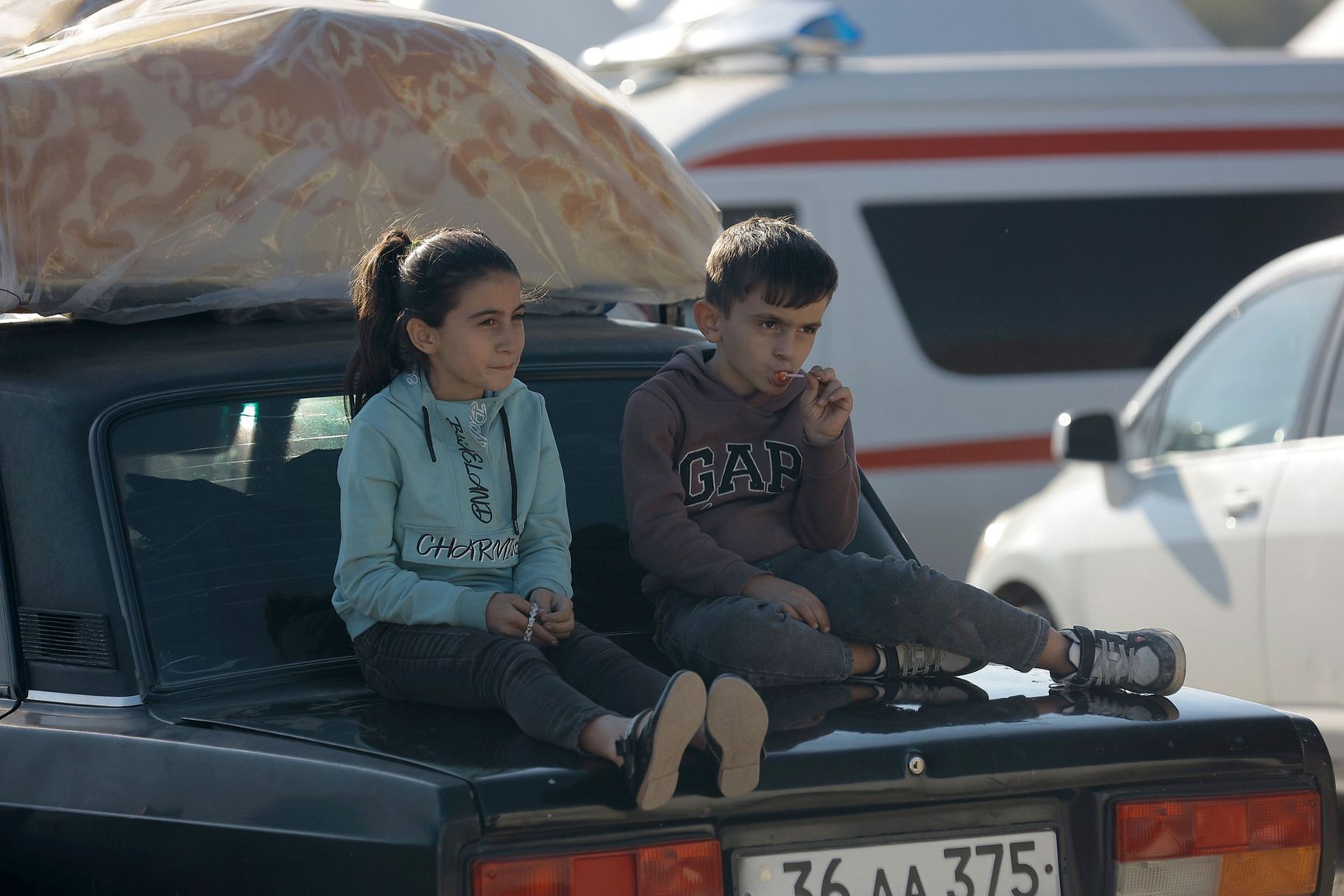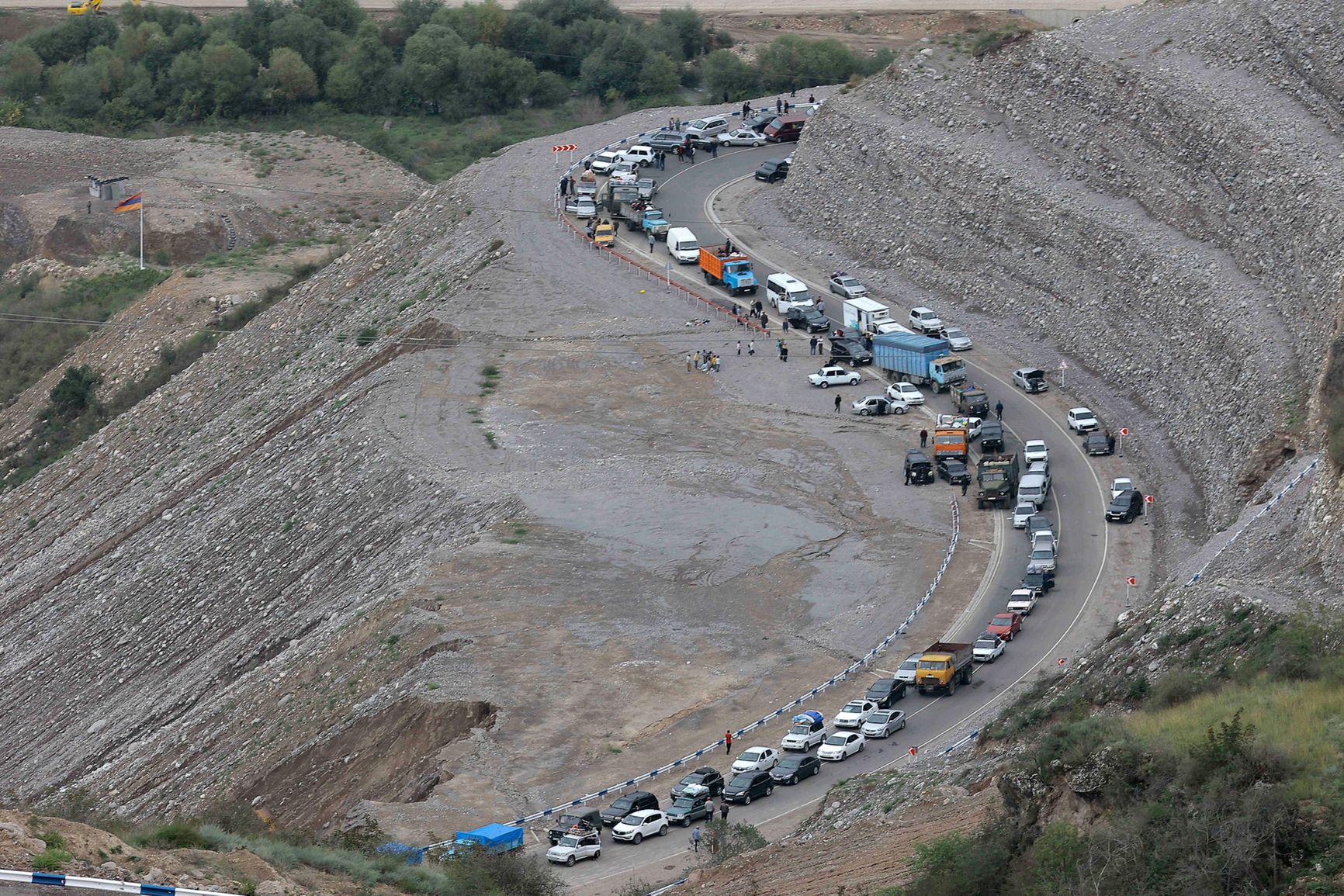

Following Azerbaijan's military operation in Nagorno-Karabakh and the surrender of the unrecognized republic, the local populace commenced a mass exodus from their homes. Tens of thousands of involuntary migrants are making their way toward Armenia through the Lachin corridor. A traffic jam has formed with hundreds of vehicles, and approximately 85 thousand people, mostly elderly and children, have already crossed the border. People bid farewell to Artsakh (the Armenian name for Nagorno-Karabakh) and feel abandoned. Some blame Prime Minister Pashinyan for betrayal, others point fingers at Russian peacekeepers. However, the latter group is smaller; Russian television channels have had their influence here.
Content
“As we heard the air raid siren, we understood a war had begun”
Putin or Pashinyan – who “surrendered” Nagorno-Karabakh?
A child says through tears, “I'll be good, mom, please give me something to eat!”
The first humanitarian medical assistance point for refugees from Nagorno-Karabakh is located in Kornidzor, a small village in the Syunik region of Armenia. The Lachin corridor is just seven kilometers away. Now this is the border with Azerbaijan, not the unrecognized Republic of Karabakh. The area is teeming with military personnel—military vehicles with Russian flags and insignia are bringing fuel from central Armenia. Russian helicopters are constantly circling in the sky.
Here, at the border, refugees gather, and Kornidzor is their first stop. The people are tired, lost, many are crying. Many do not go further—they simply have nowhere to go. Thirty minutes from here, in the town of Goris, there is a refugee camp. It is almost impossible for a journalist to enter it—the authorities argue that “people are in a depressed emotional state.” Close to the camp, numerous vehicles are heavily laden. Inside, one finds the refugees' entire lives—washing machines, chairs, children's toys, blankets. The most fortunate are those who own minibuses or trucks, enabling them to salvage more from the homes they probably won't ever again see.

Refugees' vehicle in Kornidzor
Some reached Kornidzor through kilometers-long traffic jams on the cargo beds of trucks not designed to carry people.

Refugees arrived in Kornidzor from Artsakh
However, passing through the checkpoint at the outskirts of Kornidzor is easy. There is a medical point where refugees can receive first medical aid. It's a simple tent with no medical equipment. Even if there were, it wouldn't be enough—around 45 thousand people have already entered Armenian territory.
As of the end of September around 85 thousand people have already entered Armenian territory
When asked why they came, a somber man responds, “Of course, we were forced. We didn't want this. We were told to leave.” Some of the refugees received death threats. Others say they will not live under Azerbaijan's rule as powerless slaves.

Refugee camp in Kornidzor
“As we heard the air raid siren, we understood a war had begun”
The bombing of Artsakh began during the day when people were at work, and children were at school. “As we heard the air raid siren, we understood a war had begun again,” says my interviewee, 26-year-old Tigran (name changed). On the third day, the authorities advised residents to leave the area due to intensifying bombardments. During all this time, the people of Artsakh sought shelter in administrative buildings: hospitals and schools.
Tigran recounts that he and his family spent two days in the basement of a hospital in Martakert. In the neighboring room were the bodies of those killed by the bombings, including his deceased cousin, a former member of the territorial defense. Now Tigran is in Goris, in the refugee camp. He hasn't decided where to go next.

For many, this is not their first exodus from their homeland; they became refugees during the first Karabakh war in the 1990s. Among those leaving are residents of Yerevan who moved to Stepanakert and are now returning.
When I ask people in Kornidzor, who have passed through the Lachin corridor, “Are you from Artsakh?”—they respond, “Artsakh is no more. We have no home.”

Putin or Pashinyan – who “surrendered” Nagorno-Karabakh?
There is a lively atmosphere near the refugee camp in Goris. Many people stop and eagerly join the conversation. Almost immediately, what was initially planned as an interview turns into something resembling a rally. People want to express themselves, and surprisingly, they largely agree on most issues. Anti-government sentiments are prevalent in the region. Protests are also taking place on the streets of Yerevan, and shouts of “Nikol is a traitor!” can be heard. These refer to Prime Minister Pashinyan. At the place where the road leads into Kornidzor, someone drew graffiti on a stone, stylized to resemble a tombstone with the inscription “Nikol.”

Refugees rarely mention the authorities of Karabakh directly, as if they don't exist at all. The impression is that the entire governing process emanates from Yerevan and that negotiations are conducted by the central authorities. Many accuse Nikol Pashinyan of “betraying Artsakh” and losing Putin's support—essentially echoing Kremlin propaganda.

In mid-September, Prime Minister Pashinyan announced Armenia's intention to ratify the Rome Statute, signed by the country in 1998. This means de jure that, if Putin visits Armenia, it will have to arrest him under the warrant issued against Putin by the International Criminal Court. Despite all the assurances of the Armenian prime minister that this will not affect the relationship between the two countries, local media presented it as news that Armenia is distancing itself from Russia. Official Moscow also interpreted the situation as a “series of unfriendly moves.” In addition, Armenia's ambassador to Russia was also reminded of the fact that Anna Akopyan, the wife of the Armenian prime minister, had made multiple trips to Kyiv to deliver humanitarian aid to Ukraine.
Many locals recall in conversations how Russians defended them against the Ottoman Empire. In general, among the population, the opinion that Pashinyan is a bad politician because he quarreled with Putin is popular. Many locals are grateful to Russian peacekeepers. However, there are those who criticize Putin for the situation in Ukraine, perceiving it as a conflict between brotherly nations, which is a serious accusation in the Caucasus.

One of the first refugees I manage to speak with right near the Lachin corridor is Ginush. She blames the Russians:
“You have an agreement—keep your promises to Karabakh. We did come back. We came back in 2020. Everyone counted on and hoped for the peacekeeping forces of Russia, believing that nothing would happen to us there. Though I traveled from Stepanakert to Yerevan first, with peacekeepers posted every 100 meters along the length of the road, wishing us a happy and safe journey. But now, for some reason, all of that is gone. The whole world turned a deaf ear.”
Ginush, like many other refugees, is convinced that Putin chose Ukraine over Armenia and that the Russians simply do not have the resources to defend Artsakh. “The military power spent by Russia in Ukraine would have been enough to at least reach Baku. And at the very least—to defend Artsakh,” Ginush says reproachfully.
Many people repeat standard propagandistic slogans, such as assertions that America “attacked” Putin. Such views are shaped under the influence of Russian television channels they watch here. After talking to the refugees, journalists, for the most part, head straight for Yerevan, where pro-Russian protests have been gaining momentum since September 19.

A child says through tears, “I'll be good, mom, please give me something to eat!”
At the humanitarian aid distribution point in Kornidzor, people are particularly talkative. In the bread queue, conversations revolve around the blockade that Karabakh endured in recent months.
In December 2022, the Stepanakert-Goris highway, the only road connecting Artsakh to Armenia, was blocked by people calling themselves “eco-activists.” Azerbaijan denied involvement, but in June 2023, the road came under the control of Azerbaijani military and police, putting the unrecognized Karabakh Republic under a total blockade: supplies of food and medicines, already sporadic, stopped altogether, pushing the region to the brink of a humanitarian catastrophe.

Refugees Elena and Olga share their story:
“For nine months, we endured a blockade, and Karabakh received no supplies for three months in a row. There was no electricity, no gas—essentially, it felt like we almost didn't exist. Perhaps even the concentration camps in Germany didn't witness the extremity of what we went through. Our children, in their innocence... A child cries out, saying, 'I'll be good, mom, please give me something to eat!' But where do we obtain it from? The child doesn't grasp that we are living under a blockade.”